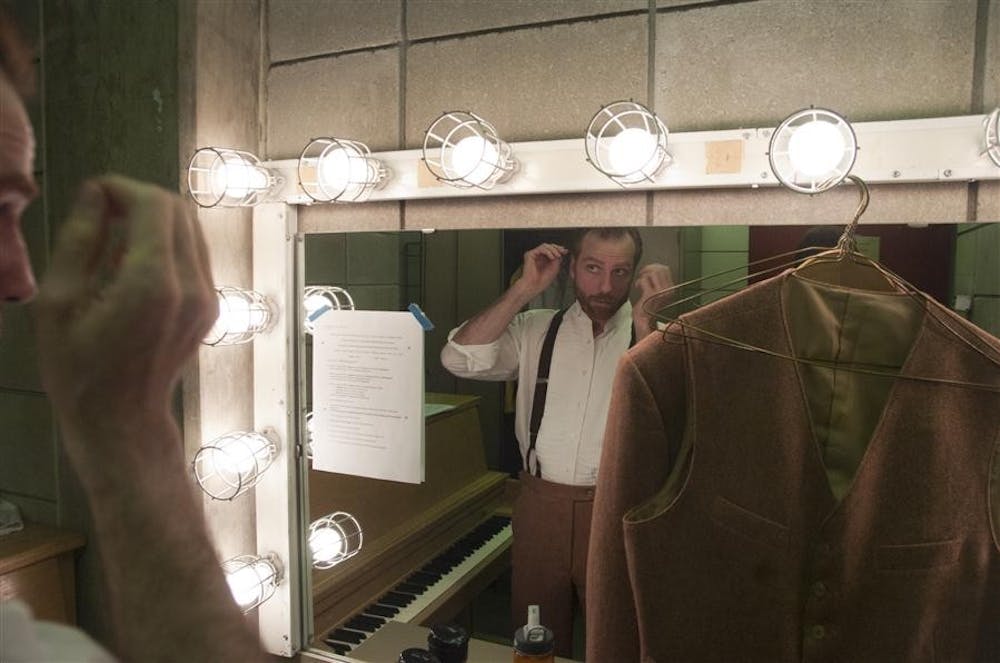The baritone bleached his dark brown hair, dyed it red and memorized 35 pages of music in a week’s time for the audition.
He hopped on a plane and arrived at IU in hopes of earning the role of troubled painter Vincent van Gogh. Out of more than 50 roles, this one is his biggest yet.
Yet now, David Adam Moore suddenly seems nervous. The backstage intercom announces five minutes to places.
Moore begins calisthenics in his dressing room. He’s wearing a tailored houndstooth wool suit from Thailand.
Moore pulls out his iPhone to scroll through van Gogh’s self-portraits.
In one of them, van Gogh is turned slightly to the left, obscuring his disfigured right ear. Moore meets van Gogh’s gaze dead on.
“His eyes have the kind of intensity that make me want to know what he’s feeling,” Moore says.
In preparation for the role, Moore scoured more than hundreds of letters van Gogh wrote to his brother Theo and learned that he was an outcast who had a tense relationship with his father.
Van Gogh, who was passionate about God and ministry, also had dreams of being an artist and was discouraged by his religious father.
Regardless of his circumstances, he made his dreams come true and is now one of the world’s most revered artists.
To further prepare for the role, Moore drew on his own experiences on how he made a dream reality.
***
Moore comes from a family of country western musicians in southeast Texas. As a child, music was everywhere, and everyone played instruments.
“Relatives would just form bands at the most random moments,” Moore said. “My father and grandfather were great singers, and they instilled in me early on a love for music in general.”
When it came time for Moore to go to college, he, like van Gogh, wanted to fulfill a dream of having a music career and pursuing religious studies in honor of God.
“I just figured that I would go to school and study music composition long enough to get good grades and then go study theology in grad school,” Moore said.
Though he’d been involved in choir in high school, Moore said he never considered himself a great singer. He was inspired by Richard Miller, the late professor of Oberlin College who wrote books about singing technique and vocal pedagogy. After saving money from a gig at Little Caesars Pizza, Moore enrolled in a workshop taught by Miller on a whim, against his teachers’ wishes.
They didn’t think he was ready, but Miller did, offering Moore a spot in his studio at Oberlin when he finished music school. And so Moore applied and barely got in.
At Oberlin, Moore discovered his love of opera.
“It’s the whole Disney story of the weird one in the village who leaves to discover who he really is,” Moore said with a laugh.
Moore’s father was on tour with country singer Tracy Byrd and “made huge sacrifices” to help Moore fund his education. His father worked as a tour bus driver and T-shirt vendor while being in his band.
Meanwhile, Moore worked a few apprenticeships and learned how to support his voice to give it “professional potential.”
Sometime thereafter, he got his big break.
***
Part of trying to know what van Gogh was feeling came from drawing on his own experiences, but it also came from trying to know who van Gogh was as a human being.
There are endless bits of information and theory Moore has had to digest to play van Gogh. But even more vital was discovering how van Gogh was relatable as a human being.
“The most important thing for me is he was uncomfortable in his own skin and his own experience. He wanted love so badly,” he said. “He had a lot of love to give and that was a source of comfort. The way he understood that was by a connection to God. He wanted to be as close to God as possible. Painting was his form of prayer.”
As fate would have it, Moore never went to theology school. But like van Gogh, Moore wants to master his craft.
The first scene of the opera shows Moore as van Gogh underneath a glowing light, behind a painting of “Starry Night.”
The Philharmonic Orchestra musicians tune their instruments and begin to play.
Moore’s first sung words are: “When I feel the need for religion / I go out and paint the stars.”
This is where life imitates art.
When life imitates art

Get stories like this in your inbox
Subscribe





